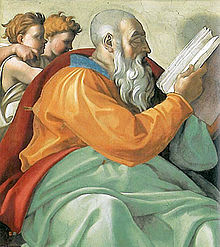Zechariah (Hebrew prophet)

Zechariah as depicted on the ceiling of the Sistine Chapel
Zechariah [a] was a person in the Hebrew Bible and traditionally considered the author of the Book of Zechariah, the eleventh of the Twelve Minor Prophets. He was a prophet of the Kingdom of Judah, and, like the prophet Ezekiel, was of priestly extraction.
Contents
1 Prophet
2 Bahá'í Faith
3 Liturgical commemoration
4 See also
5 Notes
6 References
Prophet

Zechariah as depicted by James Tissot
The book of Zechariah introduces the prophet as the son of Berechiah, the son of Iddo (Zechariah 1:1). The book of Ezra names Zechariah as the son of Iddo (Ezra 5:1 and Ezra 6:14), but it is likely that Berechiah was Zechariah's father, and Iddo was his grandfather.[1]
His prophetical career probably began in the second year of Darius, king of Persia (520 BC). His greatest concern appears to have been with the building of the Second Temple.[1]
He was probably not the "Zechariah" mentioned by Jesus in the Gospel of Matthew and the Gospel of Luke; Zechariah ben Jehoiada was more likely intended.[2]
Bahá'í Faith
Bahá'í teachers have made comparisons between the prophecies of Zechariah and the Súriy-i-Haykal in the Summons of the Lord of Hosts, a collection of the Tablets of Bahá’u’lláh.[3][importance?]
Liturgical commemoration
On the Eastern Orthodox liturgical calendar, his feast day is February 8. He is commemorated with the other Minor Prophets in the calendar of saints of the Armenian Apostolic Church on July 31. The Roman Catholic Church honors him with a feast day assigned to September 6.
See also
| Wikimedia Commons has media related to Zechariah (6 c. BC). |
- Tomb of the Prophets Haggai, Zechariah and Malachi
Zechariah (given name) for the derivation and translations of his name
Zechariah ben Jehoiada, a much earlier figure mentioned in 2 Chronicles
Zechariah (priest), the father of John the Baptist in the New Testament
Notes
^ (/zɛkəˈraɪ.ə/; Hebrew: זְכַרְיָה, Modern: Zekharya, Tiberian: Zəḵaryā, "YHWH has remembered"; Arabic: زكريّا Zakariya' or Zakkariya; Greek: Ζαχαρίας Zakharias; Latin: Zacharias)
References
![]() This article incorporates text from a publication now in the public domain: Easton, Matthew George (1897). . Easton's Bible Dictionary (New and revised ed.). T. Nelson and Sons..mw-parser-output cite.citation{font-style:inherit}.mw-parser-output .citation q{quotes:"""""""'""'"}.mw-parser-output .citation .cs1-lock-free a{background:url("//upload.wikimedia.org/wikipedia/commons/thumb/6/65/Lock-green.svg/9px-Lock-green.svg.png")no-repeat;background-position:right .1em center}.mw-parser-output .citation .cs1-lock-limited a,.mw-parser-output .citation .cs1-lock-registration a{background:url("//upload.wikimedia.org/wikipedia/commons/thumb/d/d6/Lock-gray-alt-2.svg/9px-Lock-gray-alt-2.svg.png")no-repeat;background-position:right .1em center}.mw-parser-output .citation .cs1-lock-subscription a{background:url("//upload.wikimedia.org/wikipedia/commons/thumb/a/aa/Lock-red-alt-2.svg/9px-Lock-red-alt-2.svg.png")no-repeat;background-position:right .1em center}.mw-parser-output .cs1-subscription,.mw-parser-output .cs1-registration{color:#555}.mw-parser-output .cs1-subscription span,.mw-parser-output .cs1-registration span{border-bottom:1px dotted;cursor:help}.mw-parser-output .cs1-ws-icon a{background:url("//upload.wikimedia.org/wikipedia/commons/thumb/4/4c/Wikisource-logo.svg/12px-Wikisource-logo.svg.png")no-repeat;background-position:right .1em center}.mw-parser-output code.cs1-code{color:inherit;background:inherit;border:inherit;padding:inherit}.mw-parser-output .cs1-hidden-error{display:none;font-size:100%}.mw-parser-output .cs1-visible-error{font-size:100%}.mw-parser-output .cs1-maint{display:none;color:#33aa33;margin-left:0.3em}.mw-parser-output .cs1-subscription,.mw-parser-output .cs1-registration,.mw-parser-output .cs1-format{font-size:95%}.mw-parser-output .cs1-kern-left,.mw-parser-output .cs1-kern-wl-left{padding-left:0.2em}.mw-parser-output .cs1-kern-right,.mw-parser-output .cs1-kern-wl-right{padding-right:0.2em}
This article incorporates text from a publication now in the public domain: Easton, Matthew George (1897). . Easton's Bible Dictionary (New and revised ed.). T. Nelson and Sons..mw-parser-output cite.citation{font-style:inherit}.mw-parser-output .citation q{quotes:"""""""'""'"}.mw-parser-output .citation .cs1-lock-free a{background:url("//upload.wikimedia.org/wikipedia/commons/thumb/6/65/Lock-green.svg/9px-Lock-green.svg.png")no-repeat;background-position:right .1em center}.mw-parser-output .citation .cs1-lock-limited a,.mw-parser-output .citation .cs1-lock-registration a{background:url("//upload.wikimedia.org/wikipedia/commons/thumb/d/d6/Lock-gray-alt-2.svg/9px-Lock-gray-alt-2.svg.png")no-repeat;background-position:right .1em center}.mw-parser-output .citation .cs1-lock-subscription a{background:url("//upload.wikimedia.org/wikipedia/commons/thumb/a/aa/Lock-red-alt-2.svg/9px-Lock-red-alt-2.svg.png")no-repeat;background-position:right .1em center}.mw-parser-output .cs1-subscription,.mw-parser-output .cs1-registration{color:#555}.mw-parser-output .cs1-subscription span,.mw-parser-output .cs1-registration span{border-bottom:1px dotted;cursor:help}.mw-parser-output .cs1-ws-icon a{background:url("//upload.wikimedia.org/wikipedia/commons/thumb/4/4c/Wikisource-logo.svg/12px-Wikisource-logo.svg.png")no-repeat;background-position:right .1em center}.mw-parser-output code.cs1-code{color:inherit;background:inherit;border:inherit;padding:inherit}.mw-parser-output .cs1-hidden-error{display:none;font-size:100%}.mw-parser-output .cs1-visible-error{font-size:100%}.mw-parser-output .cs1-maint{display:none;color:#33aa33;margin-left:0.3em}.mw-parser-output .cs1-subscription,.mw-parser-output .cs1-registration,.mw-parser-output .cs1-format{font-size:95%}.mw-parser-output .cs1-kern-left,.mw-parser-output .cs1-kern-wl-left{padding-left:0.2em}.mw-parser-output .cs1-kern-right,.mw-parser-output .cs1-kern-wl-right{padding-right:0.2em}
^ ab Hirsch, Emil G. (1906). "Zechariah". In Cyrus Adler; et al. Jewish Encyclopedia. New York: Funk & Wagnalls Co.
^ Pao & Schnabel on Luke 11:49–51 (2007). Beale & Carson, ed. Commentary on the New Testament Use of the Old Testament. ISBN 978-0801026935.most identify this figure with the Zechariah of 2 Chron. 24:20–25, who was killed in the temple court
^ Cynthia C. Shawamreh (December 1998). "Comparison of the Suriy-i-Haykal and the Prophecies of Zechariah". Wilmette Institute.

